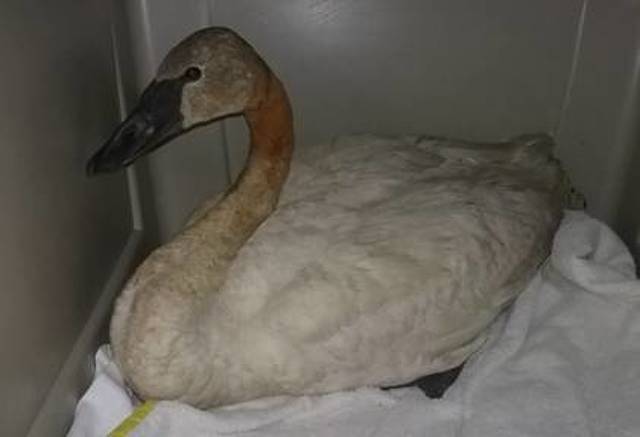STATE COLLEGE — In the beginning of June, a weak, starved and ailing swan landed in the grass near a business on East College Avenue. Far from its usual summer home in northern Canada, this lone bird, a tundra swan, had fallen behind its flock of travel companions.
‘It missed the migration event,’ said Robyn Graboski, of Centre Wildlife Care. ‘(It) was just too weak and exhausted to go any farther.’
Graboski, whose Port Matilda organization has cared for and released more than 100 animals so far this year, got a call from a woman who told her about the unusual bird slumped in the grass. As she and fellow rescuer Suzanne Dearment drove back from an event in Harrisburg, they spoke with the caller and decided to take steps to help the swan.
‘If we hadn’t recovered it, it wouldn’t have survived,’ Graboski said.
Graboski and Dearment had no trouble catching the swan, wrapping a towel around it and carrying it to their vehicle. ‘Too sick to argue,’ the bird rode on Graboski’s lap. Once they arrived at the Port Matilda facility, they could better assess the bird’s condition.
‘It had no injuries,’ Graboski said, ‘and tested negative for lead poisoning and negative for West Nile.’
Further testing revealed an alarming quantity of parasites, along with anemia, infection and yeast.
‘It’s not unusual to find parasite activity in birds, but this one had a particularly heavy load,’ she said.
They administered antibiotics, anti-virals, tube-feeding and plenty of fluids and, after a few weeks, the swan could eat on its own and move around. Graboski said they have no way of pinpointing exactly what happened to it, but she likes seeing the steps it has made toward recovery.
‘It has a large enclosure with a pool, and spends its days paddling around with a mallard duck recuperating from a broken leg,’ she said.
If all goes well, Graboski plans to hold the bird until fall when she will coordinate with other rehabbers to integrate it with migrating flocks.
‘It’s not ready, yet,’ she said. ‘We have to build the muscles back up. When it’s time, we’ll be sure to do the right thing.’
Centre Wildlife, which Graboski said runs totally on donated funds, has rehabbed some unusual birds over the years. They include an emu, a tern from Trinidad, an oceanic migrant called a ‘shearwater’ and a white pelican native to South America.
‘They get caught up in hurricanes,’ according to Graboski, ‘and people find them in their backyards.’
Although her facility has reached capacity, Graboski urged anyone who discovers an injured or ailing bird to seek help for it. The state has more than 25 rehab organizations for wildlife.
‘Take a cell phone photo, use social media or contact the game commission. If you think a bird is out of its element, take steps to reach out.’



